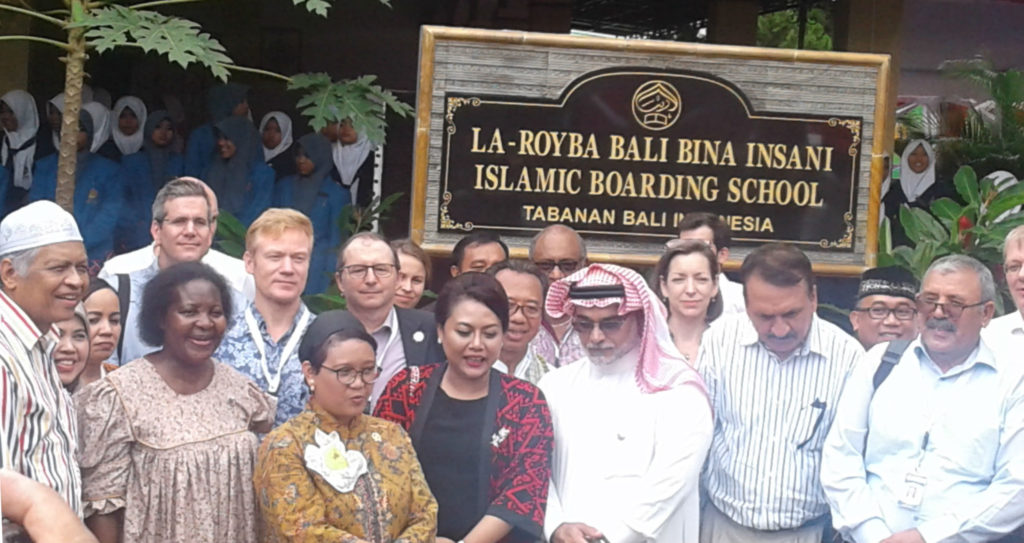
In December 2016, Indonesia’s Ministry of Foreign Affairs hosted the 9th annual Bali Democracy Forum (BDF). Founded in 2008 during the presidency of Susilo Bambang Yudhoyono, the BDF has been central to Indonesia’s diplomatic strategy to assert its role as an important regional power on the global stage. Former Minister of Foreign Affairs, Dr. Hassan J. Wirajuda, envisioned the BDF as a diplomatic platform in which Indonesia could promote democracy by sharing Indonesia’s own lessons from its democratic transition. The BDF’s implementing agency, the Institute for Peace and Democracy (IPD), has now become the legacy of what Wirajuda refers to as “total diplomacy”—a combination of formal government-to-government diplomacy and person-to-person public diplomacy. Indeed, Yudhoyono heralded his foreign policy in terms of “a million friends, zero enemies.”
The theme for the 2016 BDF, “Religion, Democracy, and Pluralism”, is in keeping with the IPD’s goal to use the forum to showcase Indonesia’s form of “moderate Islam.” However, at the time that current Indonesian President Joko Widodo (Jokowi) gave the BDF opening address, he was contending with Islamic State-inspired terror at home, a contentious blasphemy trial of Jakarta’s Chinese-Christian governor, and frequent mass rallies to “defend Islam” —one of which was held at the doorstep of the state palace. The looming question at the parallel media and civil society forum was whether Indonesia can still tout itself as the shining example of “moderate Islam.”
Domestic challenges to religious tolerance and pluralism notwithstanding, Indonesia’s foreign ministry was nonetheless intent on promoting the image of Indonesia as the home of religious pluralism. On the second day of the BDF, Indonesia’s foreign minister, Retno Marsudi, escorted representatives from nearly 100 countries to the Bina Insani Islamic school located in the heart of the Hindu-majority island of Bali. As delegates descended from luxury tour buses, they were welcomed by an ensemble of Balinese music and dance, and they took their seats of honor in the front rows of an outdoor covered stage with a huge red banner welcoming BDF delegates.

A young female student began the program with a Qur’anic verse, recited in eloquent Arabic, about ethnic and religious pluralism. After government officials welcomed BDF delegates, a Hindu woman who taught at the school shared her personal testimony about feeling welcomed into this community. Next, schoolgirls recited moving poems about tolerance and pluralism–one in English, the other in Arabic: a linguistic showcase of an Indonesian Muslim cosmopolitanism at ease with both the West and the Arab world. (At the most esteemed Islamic schools in Indonesia students must learn both Arabic and English.) Finally, the school’s director shared stories about his childhood in Bali, his education at the state Islamic school in Jakarta, and his return to found this school as one way to promote Indonesia’s national motto Bhinneka Tunggal Ika, “unity in diversity.”
As the program concluded, the Saudi Arabian ambassador to Indonesia, Osama Mohammad Abdullah Alshuaibi, leapt to his feet and loudly proclaimed how impressed he was that this Islamic school reflected the Qur’anic notion that Islam came as a “blessing for all humankind and the universe.” With no small dose of national pride, the Saudi ambassador pledged his kingdom’s donation of $50,000 to the school. For decades, Saudi’s cash diplomacy in Indonesia has offered free hajj pilgrimages, funded the teaching of Arabic in Indonesia, and provided scholarships for religious study in Saudi Arabia.
Scanning the diverse audience of government officials, Islamic school teachers, and foreign diplomats, I observed reactions ranging from awestruck jubilation to horror and disappointment. One phrase from the cacophony of voices was especially memorable: duit boleh, asal jangan guru, or “your money is OK, as long as it’s not your religion teachers.” Following the festive announcement, the school director gave the delegates a personal tour of the campus, with Indonesia’s Director of Public Diplomacy walking side-by-side with the Saudi ambassador. A couple diplomats from Western Europe trailed behind, murmuring about the audacity and excessiveness of Saudi diplomacy.

This combination of awe and horror is perhaps the best way to characterize Indonesia’s complex diplomatic ties, religious lineages, and cultural fascination with Saudi Arabia. Despite Indonesia’s rich heritage of globally-learned religious scholars, Indonesians have shown little interest in exporting these scholars. Whereas the works of Arab scholars are often translated into Indonesian, the reverse is seldom the case. Saudi Arabia thus enjoys an aura of religious authenticity in some sectors of Indonesia’s popular imagination. As suggested by the current visit of King Salman bin Abdulaziz al Saud, some Indonesian politicians and religious leaders jockey for Saudi praise, while others bemoan Saudi Arabia as a kingdom which has gone astray from Islam’s true religious principles, whose exported Wahhabi theology threatens Indonesian national integrity, and whose wealthy citizens have been accused of torturing their Indonesian housemaids. Whereas some seek to emulate versions of Islam espoused as “Arab,” others fear the Arabization of Indonesian Islam. Indonesians returning from pilgrimage often recount stories of gruff, impolite, and unrefined Saudis who sharply contrast with the refinement of most Indonesian Muslims. Jakarta taxi drivers relish stories about Arab tourists who venture to Indonesia for sin-ridden excursions.
The machinations of “total diplomacy” become ever more complicated in light of King Salman’s expected announcement that Saudi Arabia plans to partner with Indonesia to combat the Islamic State and to promote “moderate Islam.” Indonesian foreign policy finds itself at a crossroads. Whereas the promotion of “moderate Islam” plays well with Western parties, it can further complicate bilateral relations between Indonesia and, for example, Turkey, Egypt, and Saudi Arabia. Partnerships to promote “moderate Islam” do not necessarily imply that each country perceives the other’s practice of Islam as authentic or rooted in authoritative tradition.
When I conversed with the Saudi ambassador on the bus back to the BDF, he told me that Indonesians had yet to practice “authentic Islam” and lamented the use of music and mixing of genders at the Islamic school. “But it would be rude to publicly declare such things,” he proceeded. “We must realize that this is their culture and how they understand Islam. Remember, Islam has only been here for a few centuries.” His remark combined the linguistic finesse of a diplomat with the inexorable scorn of a colonial officer. Despite the rhetoric of cultural variety within Islam, it would seem unthinkable for the Saudi king to visit the Indonesian state palace and laud the concept of Islam Nusantara, the “Islam of the Archipelago”, that has served as a mantra of authentic, yet regionally distinct Islam for which Indonesians should feel a sense of pride, not inferiority, vis-a-vis Arab articulations of Islam.
The predicaments of Saudi’s cash diplomacy and Indonesia’s “moderate Islam” have implications for how we understand issues of authority, identity, and community in relation to multiple visions of Muslim modernity. Whereas public affirmations of an inspired allegiance to a global Islamic umma play well in certain circles, persistent questions about religious authority and political legitimacy, informed by actual bilateral relations and reported human rights violations of Indonesian domestic laborers in Saudi Arabia, strain the bonds of religious solidarity. At the same time, voices critical of the Indonesian state’s response to a major blasphemy case look approvingly to the Wahhabis as the true defenders of Islam. The pleasantries of public diplomacy are not always compatible with the realities of real politik. Ultimately, the Indonesian state’s most important task will be to successfully ensure merciful and compassionate Islam at home, not just “moderate Islam” abroad.
As Marcel Mauss has observed, gifts are always given in relations of power, and there are no unencumbered gifts among friends. President Jokowi has already displayed a willingness to depart from Yudhoyono’s foreign policy of “a million friends, zero enemies.” Indeed, one need not make enemies in order to keep some friends at a safer distance. “Your money is OK, just not your religion teachers.”

